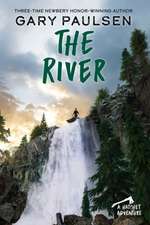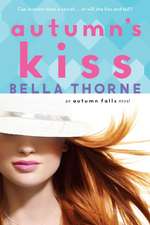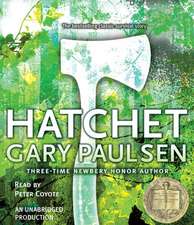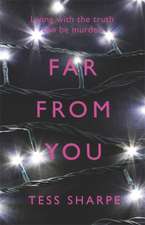Brian's Hunt
Autor Gary Paulsenen Limba Engleză Paperback – 29 feb 2012 – vârsta de la 12 ani
Vezi toate premiile Carte premiată
When Brian finds a dog one night, a dog that is wounded and whimpering, he senses danger. The dog is badly hurt, and as Brian cares for it, he worries about his Cree friends who live north of his camp. His instincts tell him to head north, quickly. With his new companion at his side, and with a terrible, growing sense of unease, he sets out to learn what happened. He sets out on the hunt.
From the Hardcover edition.
Preț: 57.27 lei
Nou
Puncte Express: 86
Preț estimativ în valută:
10.96€ • 11.44$ • 9.07£
10.96€ • 11.44$ • 9.07£
Carte disponibilă
Livrare economică 14-28 martie
Preluare comenzi: 021 569.72.76
Specificații
ISBN-13: 9780307929594
ISBN-10: 0307929590
Pagini: 103
Dimensiuni: 140 x 208 x 5 mm
Greutate: 0.11 kg
Editura: Ember
ISBN-10: 0307929590
Pagini: 103
Dimensiuni: 140 x 208 x 5 mm
Greutate: 0.11 kg
Editura: Ember
Notă biografică
GARY PAULSEN is the distinguished author of many critically acclaimed books for young people. His most recent books are Flat Broke; Liar, Liar; Masters of Disaster; Lawn Boy Returns; Woods Runner; Notes from the Dog; Mudshark; Lawn Boy; Molly McGinty Has a Really Good Day; The Time Hackers; and The Amazing Life of Birds (The Twenty Day Puberty Journal of Duane Homer Leech).
Extras
Chapter 1
He was in his world again. He was back.
It was high summer coming to fall and Brian was back in the far reaches of wilderness--or as he thought of it now, home. He had his canoe and bow and matches and this time he'd added some dried food, beans and rice and sugar. He also had a small container of tea, which he'd come to enjoy. He had a small cook set, and a can to make little fires in the middle of the canoe; he put leaves on to make smoke to drive the flies and gnats and mosquitoes away. He had some salt and pepper and, almost a treat, matches. He still could not get over how wonderful it was to just be able to make a fire when he wanted one, and he never sat down to a cook fire without smiling and remembering when his life in the wilderness had begun. His first time alone.
He dreamt of it often and at first his dreams sometimes had the qualities of nightmares. He dreamt he was sitting there in the small plane, the only passenger, with the pilot dying and the plane crashing into the lake below. He awakened sometimes with sudden fear, his breath coming fast. The crash itself had been so wild and he had been so out of control that the more he had grown in the years since, the more he had learned and handled difficult situations, the more insane the crash seemed; a wild, careening, ripping ride down through trees to end not in peace but in the water, nearly drowning--in the nightmares it was like dying and then not dying to die again.
But the bad dreams were rare, rarer all the time, and when he had them at all now they were in the nature of fond memories of his first months alone in the bush, or even full-blown humor: the skunk that had moved in with him and kept the bear away; how Brian had eaten too many gut berries, which he'd later found were really called chokecherries (a great name, he thought); a chickadee that had once landed on his knee to take food from his hand.
He had been . . . young then, more than two years ago. He was still young by most standards, just sixteen. But he was more seasoned now and back then he had acted young--no, that wasn't quite it either. New. He had been new then and now he was perhaps not so new.
He paused in his thinking and let the outside world come into his open mind. East edge of a small lake, midday, there would be small fish in the reeds and lily pads, sunfish and bluegills, good eating fish, and he'd have to catch some for his one hot meal a day. Sun high overhead, warm on his back but not hot the way it had been earlier in the week; no, hot but not muggy. The summer was drying out, getting ready for fall. Loon cry off to the left, not distress, not a baby lost to pike or musky; the babies would be big enough now to evade danger on their own, almost ready to fly, and would not have to ride on their mother's backs for safety as they did when they were first hatched out.
He was close in on the lily pads and something moved suddenly in the brush just up the bank, rustling through the thick, green foliage, and though it sounded big and made a lot of noise he knew it was probably a squirrel or even a mouse. They made an inordinate amount of noise as they traveled through the leaves and humus on the ground. And there was no heavy footfall feeling as there would be with a moose or deer or bear, although bear usually were relatively quiet when they moved.
High-pitched screeeeee of hawk or eagle hunting and calling to his or her mate; he couldn't always tell yet between the cry of hawk and eagle.
A yip of coyote, not wolf because it was not deep enough, and not a call, not a howl or a song but more a yip of irritation.
He had heard that yip before when he'd watched a coyote hunting mice by a huge old pine log. The log had holes beneath it from one side to the other and the mice could dance back and forth beneath the log through the holes, while the coyote had to run around the end, or jump over the top, and the mice simply scurried back and forth under it to avoid him. The coyote tried everything, hiding, waiting, digging a hole big enough for himself under the log so he could move back and forth, but nothing worked. After over an hour of trying to get at the mice, he finally stood on top of the log looking down one side, then the other, raised his head and looked right at Brian as if he'd known Brian was there the whole time, and gave an irritated, downright angry yip. It was, Brian felt, a kind of swearing.
Up ahead four hundred yards, a moose was feeding in the lily pads, putting its head underwater to pull up the succulent roots, and Brian knew it would be an easy kill if he wanted it. Canoes seemed such a part of nature to the animals in the wild--perhaps they thought canoes were logs--and if a person kept very still it was often possible to glide right up next to an animal near the water. In many states it was illegal to hunt from a canoe for just that reason. Brian had once canoed up next to and touched a fawn standing in the shallows. And with feeding moose it was simpler yet; all you had to do was scoot forward when the moose had its head underwater and coast when its head was up, looking around.
Brian had plenty of arrows: a dozen and a half field points with sixty extra points and a hundred extra shafts and equipment to make more arrows, and two dozen broadhead arrows as well as fifty extra broadhead points with triple-blade heads the military had designed for covert work many years before. These were called MA 3s. Deadly. And if sharpened frequently, they were strong enough to reuse many times if you didn't hit a bone or miss and catch a rock.
Looking at the moose, he salivated, thinking of the red meat and how it would taste roasted over a fire. But then he decided against it. The moose was a small bull, probably only six or seven hundred pounds, and nowhere near the fourteen or fifteen hundred pounds a large bull would weigh, but even so it was a lot of meat to deal with and he couldn't bring himself to waste anything he killed. He had gone hungry so long when he had first come to the bush. . . . Food had been everything and the thought of wasting any of it went against every instinct in his body. Even if he made a smoke fire and dried most of it in strips he would still lose some meat. . . .
Still, he could see the shot. Close to the moose, close in but far enough away to avoid an attack, the bow already strung. Wait until he ducked under to draw the bow and then as soon as the head came up release the MA 3 just in back of the shoulder, under the shoulder blade and the broadhead would go straight into the heart. . . .
From the Hardcover edition.
He was in his world again. He was back.
It was high summer coming to fall and Brian was back in the far reaches of wilderness--or as he thought of it now, home. He had his canoe and bow and matches and this time he'd added some dried food, beans and rice and sugar. He also had a small container of tea, which he'd come to enjoy. He had a small cook set, and a can to make little fires in the middle of the canoe; he put leaves on to make smoke to drive the flies and gnats and mosquitoes away. He had some salt and pepper and, almost a treat, matches. He still could not get over how wonderful it was to just be able to make a fire when he wanted one, and he never sat down to a cook fire without smiling and remembering when his life in the wilderness had begun. His first time alone.
He dreamt of it often and at first his dreams sometimes had the qualities of nightmares. He dreamt he was sitting there in the small plane, the only passenger, with the pilot dying and the plane crashing into the lake below. He awakened sometimes with sudden fear, his breath coming fast. The crash itself had been so wild and he had been so out of control that the more he had grown in the years since, the more he had learned and handled difficult situations, the more insane the crash seemed; a wild, careening, ripping ride down through trees to end not in peace but in the water, nearly drowning--in the nightmares it was like dying and then not dying to die again.
But the bad dreams were rare, rarer all the time, and when he had them at all now they were in the nature of fond memories of his first months alone in the bush, or even full-blown humor: the skunk that had moved in with him and kept the bear away; how Brian had eaten too many gut berries, which he'd later found were really called chokecherries (a great name, he thought); a chickadee that had once landed on his knee to take food from his hand.
He had been . . . young then, more than two years ago. He was still young by most standards, just sixteen. But he was more seasoned now and back then he had acted young--no, that wasn't quite it either. New. He had been new then and now he was perhaps not so new.
He paused in his thinking and let the outside world come into his open mind. East edge of a small lake, midday, there would be small fish in the reeds and lily pads, sunfish and bluegills, good eating fish, and he'd have to catch some for his one hot meal a day. Sun high overhead, warm on his back but not hot the way it had been earlier in the week; no, hot but not muggy. The summer was drying out, getting ready for fall. Loon cry off to the left, not distress, not a baby lost to pike or musky; the babies would be big enough now to evade danger on their own, almost ready to fly, and would not have to ride on their mother's backs for safety as they did when they were first hatched out.
He was close in on the lily pads and something moved suddenly in the brush just up the bank, rustling through the thick, green foliage, and though it sounded big and made a lot of noise he knew it was probably a squirrel or even a mouse. They made an inordinate amount of noise as they traveled through the leaves and humus on the ground. And there was no heavy footfall feeling as there would be with a moose or deer or bear, although bear usually were relatively quiet when they moved.
High-pitched screeeeee of hawk or eagle hunting and calling to his or her mate; he couldn't always tell yet between the cry of hawk and eagle.
A yip of coyote, not wolf because it was not deep enough, and not a call, not a howl or a song but more a yip of irritation.
He had heard that yip before when he'd watched a coyote hunting mice by a huge old pine log. The log had holes beneath it from one side to the other and the mice could dance back and forth beneath the log through the holes, while the coyote had to run around the end, or jump over the top, and the mice simply scurried back and forth under it to avoid him. The coyote tried everything, hiding, waiting, digging a hole big enough for himself under the log so he could move back and forth, but nothing worked. After over an hour of trying to get at the mice, he finally stood on top of the log looking down one side, then the other, raised his head and looked right at Brian as if he'd known Brian was there the whole time, and gave an irritated, downright angry yip. It was, Brian felt, a kind of swearing.
Up ahead four hundred yards, a moose was feeding in the lily pads, putting its head underwater to pull up the succulent roots, and Brian knew it would be an easy kill if he wanted it. Canoes seemed such a part of nature to the animals in the wild--perhaps they thought canoes were logs--and if a person kept very still it was often possible to glide right up next to an animal near the water. In many states it was illegal to hunt from a canoe for just that reason. Brian had once canoed up next to and touched a fawn standing in the shallows. And with feeding moose it was simpler yet; all you had to do was scoot forward when the moose had its head underwater and coast when its head was up, looking around.
Brian had plenty of arrows: a dozen and a half field points with sixty extra points and a hundred extra shafts and equipment to make more arrows, and two dozen broadhead arrows as well as fifty extra broadhead points with triple-blade heads the military had designed for covert work many years before. These were called MA 3s. Deadly. And if sharpened frequently, they were strong enough to reuse many times if you didn't hit a bone or miss and catch a rock.
Looking at the moose, he salivated, thinking of the red meat and how it would taste roasted over a fire. But then he decided against it. The moose was a small bull, probably only six or seven hundred pounds, and nowhere near the fourteen or fifteen hundred pounds a large bull would weigh, but even so it was a lot of meat to deal with and he couldn't bring himself to waste anything he killed. He had gone hungry so long when he had first come to the bush. . . . Food had been everything and the thought of wasting any of it went against every instinct in his body. Even if he made a smoke fire and dried most of it in strips he would still lose some meat. . . .
Still, he could see the shot. Close to the moose, close in but far enough away to avoid an attack, the bow already strung. Wait until he ducked under to draw the bow and then as soon as the head came up release the MA 3 just in back of the shoulder, under the shoulder blade and the broadhead would go straight into the heart. . . .
From the Hardcover edition.
Premii
- Colorado Children's Book Award Nominee, 2006













